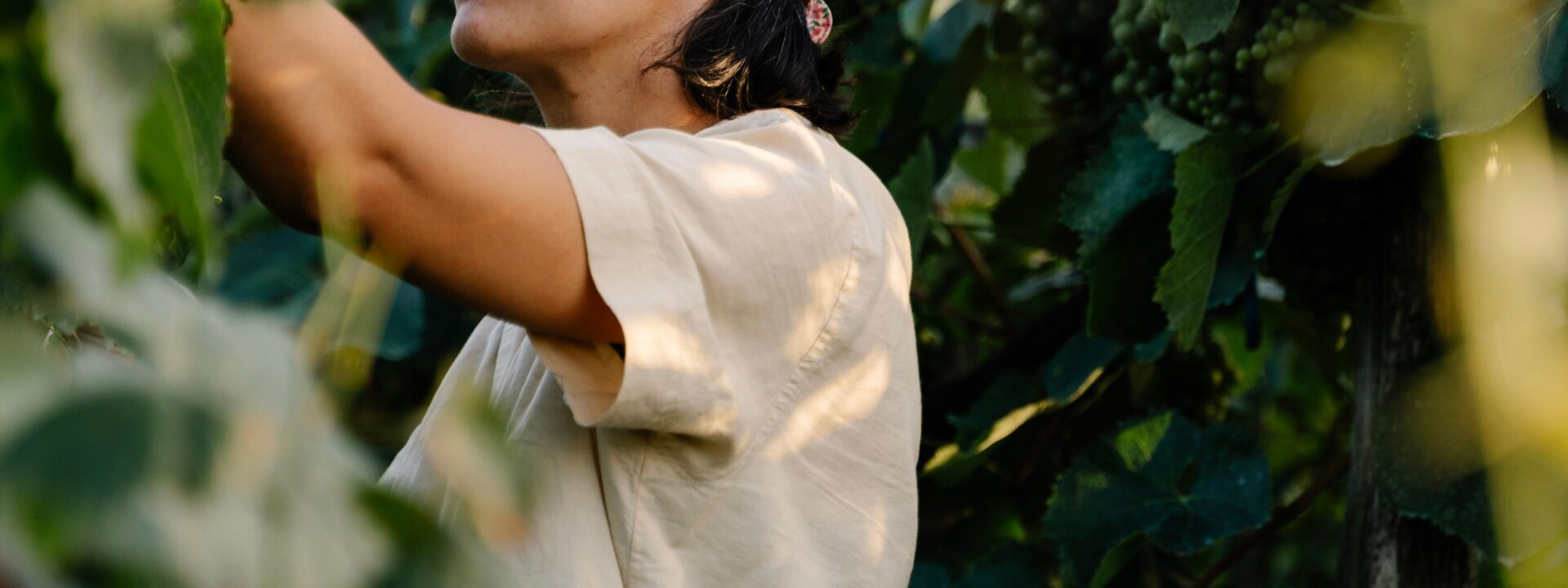Nestled against the Greater Caucasus Mountains, the small country of Georgia is gaining popularity as an off-the-beaten-path destination. Travelers are drawn by its dramatic landscapes—sprawling mountains and deep valleys—and the promise of hearty meals after a day of hiking. Georgian hospitality is legendary; you’re never far from a glass of wine, whether at a traditional feast called a supra or when rangers spontaneously invite you to toast during a hike in one of the national parks.
A highlight is qvevri wine, an amber or orange wine aged in clay amphorae. This ancient technique, recognized by UNESCO as an Intangible Cultural Heritage, dates back over 8,000 years.
For much of Georgia’s history, winemaking was male-dominated. But in recent years, more women have entered the field, often focusing on natural, organic wines with minimal intervention. Many are reviving native grape varieties, taking a gentler approach to working the land.
From the famous wine region of Kakheti to lesser-known areas like Imereti and Samegrelo, women-owned wineries are appearing across the country. Here are a few inspiring figures leading this change.
Baia Abuladze, co-owner of Baia’s Wine in Imereti
Photo: Jessica Jungbauer
Leaving the highway between Tbilisi and Kutaisi, you arrive in the quiet village of Obcha, where fields stretch into the distance and cows graze peacefully. Here, Baia’s Wine has made a name for itself—even internationally—by specializing in natural wines from local Imeretian grapes like Tsitska, Tsolikouri, and Krakhuna.
Baia Abuladze founded the winery in 2015, making it one of Georgia’s first female-led wineries. “Now, more women are visible,” Abuladze says. “Women have always been part of the work, but usually behind the scenes—labeling or selling wine. Today, you’ll find many women leading wineries, even in challenging regions like Samegrelo.”
Photo: Jessica Jungbauer
After studying agriculture in Tbilisi, Abuladze returned home to take over her family’s fourth-generation winery. Together with her sister Gvantsa and brother Giorgi, she runs the vineyard and winery sustainably. Starting with just two hectares, they’ve since planted 18 hectares of traditional varieties and farm organically. “You need a lot of specific knowledge,” she notes. “We now have about 10 years of experience working with grapes and vines around the clock.”
According to Abuladze, Imereti isn’t yet a well-known wine region, but it’s special because of its small-scale farming traditions. “We grow in very humid conditions, but the clay soil retains moisture, giving our grapes a medium acidity. They’re fresh and floral, pairing perfectly with the richness of Georgian cuisine.”
Photo: Jessica Jungbauer
After a tour of the property, guests are treated to a spread of homemade Georgian dishes, including Imeretian specialties like nigvziani badrijani—eggplant rolls filled with walnut paste and pomegranate. Overnight stays are available, with breakfast served outdoors overlooking the vineyards.
Keto Ninidze, owner of Oda Family Winery in Samegrelo
Photo: Jessica Jungbauer
At Oda Family Winery in Samegrelo, you’re welcomed by the women running the kitchen of the popular restaurant. The garden and vineyards beyond are filled with locals and visitors alike. Keto Ninidze and her all-female team embody the warm hospitality of this lesser-known wine region. They also champion native Samegrelo grapes like Ojaleshi, as well as Tsolikouri and Dz
Frequently Asked Questions
Of course Here is a list of FAQs about the trailblazing women winemakers in Georgia designed to be clear concise and helpful for everyone from beginners to enthusiasts
General Beginner Questions
1 Why is Georgias wine region considered so special
Georgia is one of the oldest wineproducing regions in the world with over 8000 years of winemaking history Its famous for its traditional method of fermenting wine in large eggshaped clay vessels called qvevri which are buried underground
2 Who are these trailblazing women winemakers
They are a growing group of female winemakers and vineyard owners in Georgia who are challenging traditions reviving ancient grape varieties and bringing a fresh modern perspective to one of the worlds oldest wine cultures
3 Whats different about wine made by women
While anyone can make great wine these women often bring a distinct approach focusing on meticulous vineyard care natural winemaking methods and a collaborative spirit They are often at the forefront of the natural wine movement in Georgia
4 Is this a new trend
Women have always been involved in Georgian winemaking but they are now gaining recognition as lead winemakers and winery owners shaking up a traditionally maledominated industry
Deeper Dive Advanced Questions
5 What are some native Georgian grape varieties I should look for
Look for white grapes like Rkatsiteli and Kisi which make complex ambercolored wines in qvevri For reds seek out Saperavi a bold darkskinned grape that can produce powerful ageworthy wines
6 What is amber wine and why is it associated with Georgia
Amber wine is white wine made like a red winethe grape skins are left in contact with the juice during fermentation This gives the wine a distinctive orange or amber color more tannin and a complex nutty flavor Georgia is its historic birthplace
7 What challenges do women face in the Georgian wine industry
They often face challenges like overcoming deepseated cultural traditions securing funding and land and gaining respect in a field where men have historically held all the decisionmaking roles
